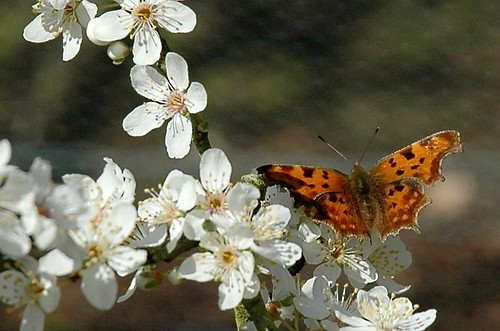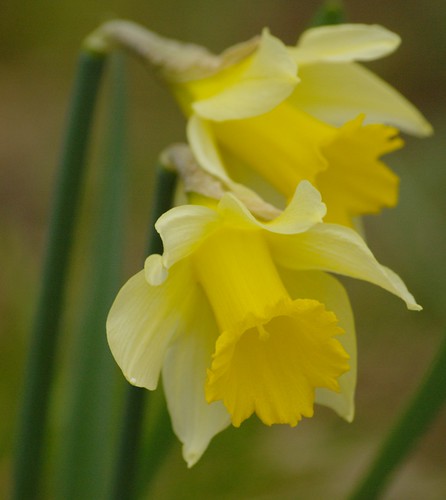Al is Mamertus oud en grijs,
Toch houdt hij nog van sneeuw en ijs…
Of is Servaas de verantwoordelijke als het vriest in de nacht van 11 op 12 mei?
De aardappelen had ik gisteren nog aangeaard…
Al is Mamertus oud en grijs,
Toch houdt hij nog van sneeuw en ijs…
Of is Servaas de verantwoordelijke als het vriest in de nacht van 11 op 12 mei?
De aardappelen had ik gisteren nog aangeaard…

Blaast april op zijn hoorn,
is dat goed voor gras en koorn.
When April blows his horn,
it brings good crops of hay and corn.
Laat het weer zijn zoals het wil,
ontkleed u niet voor half april.
Change not a clout
’till April’s out.
April maakt de bloem,
en mei bekomt de roem.
April showers
bring May flowers.
Iedere maand opnieuw verrast het me, dat het zo gemakkelijk is om in beide talen weerspreuken te vinden die vrijwel dezelfde inhoud hebben.
Every month I’m pleasantly surprised to find both Dutch and English sayings with almost the same content.

Dat gezegde wordt meestal verklaart en begrepen als ‘maart begint koud en guur, maar kan met zacht temperaturen eindigen.’
Tja, dat heeft maart dan dit jaar in elk geval wel waargemaakt!
Maar de verklaring schijnt toch elders te liggen: Op 1 maart, ’s avonds rond 20.00, kan je het sterrenbeeld Ram (en een jonge ram is een lammetje) heel zwak waarnemen boven de westelijke horizon. Het sterrenbeeld Leeuw daarentegen, staat ongeveer even hoog boven de horizon, maar aan de oostelijke einder.
Op 31 maart ziet het er rond dezelfde tijd ’s avonds iets anders uit. Leeuw staat dan practisch recht boven je hoofd, terwijl Ram (het lammetje dus) al gedeeltelijk achter de horizon verdwenen is. Het gezegde zou ontstaan zijn omdat men heeft opgemerkt dat bij het begin van maart ‘Leeuw’ ’s avonds net tevoorschijn komt, terwijl eind maart Ram (Lam) de avondhemel verlaat.
Ach, wat er ook van zij, het weer is nu zo zacht als een lammetje, en daar kan ik alleen maar van genieten.
A few weeks ago, I published a post with some March weather lore, and Rob commented there was always that English expression ‘In like a lion, out like a lamb’.
This saying is often explained by pointing to the weather and temperature in March. At the beginning it can be rather inclement and chilly, and towards the end it’s may be milder…
Well, at least this year this seems to be true. The last few days of March are very mild here: although it freezes at night, by day wehave temperatures around 15° C (60° F), and, more important, a clear blue sky.
But some say the true origins of the expression can be found elsewhere.
On March 1st about 8 p.m. your local time you will see the very dim stars that make up the constellation Aries (the ram, or lamb) above the northwestern horizon. But if you look in almost the opposite direction toward the northeast about the same height above the horizon you’ll see the constellation Leo (the lion).
But what will we see if we go out at the same time a month later on March 31st? Well quite a different story, because on March 31st at 8 p.m. the lion will be almost overhead and the lamb will be smack dab on the northwestern horizon.
So, on March 1st, the lion just comes into the sky, and on March 31st, the ram (lamb) is going out…
Whatever is the true explanation, I enjoy those milder days we’re having now…

Vochtige maart,
de boeren smarten baart.
As it rains in March so it rains in June
Maart droog, mei nat,
veel hooi en zaad zat.
A dry March and a wet May
Fill barns and bays with corn and hay.
Maartse wind en aprilse regen,
beloven voor mei de grootste zegen.
March winds and April showers
Bring forth May flowers.
Vriezende januari, natte februari,
droge maart, regen in april,
is de boeren hunnen wil.
If January has never a drop, the barn will need an open prop
If in February there be no rain, it is neither good for hay nor grain.
March damp and warm, will do the farmer much harm.
April cold and wet, fills the barns best yet.
Cold May and windy, barn filleth up finely.
Als februari de muggen zwermen,
moet men in maart de oren wermen.
When gnats dance in February the husbandman becomes a beggar.
Februari kil en nat,
koren in ’t vat.
If February give much snow
A fine summer it doth foreshow.